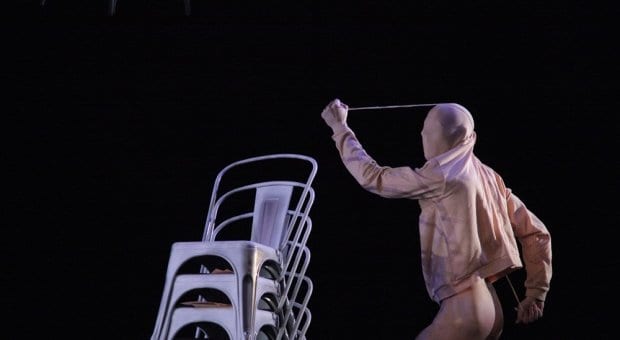The piece begins with a man and woman onstage, her fully dressed, him nude except for a pair of tattered and Superglued Lacoste tennis shoes. Dora Mavor Moore Award–winner Brendan Wyatt does indeed bare it all for Speak, Love, a passionate and envelope-pushing dance duet with his dance partner — and also the choreographer and artistic director for Blackandblue Dance Projects — Sasha Ivanochko.
Essentially, the piece is a tumultuous disagreement over the nature of love. Ivanochko’s choreography uses the contrast between the works of Rumi, a 13th-century Persian poet, and Roland Barthes, a 20th-century French literary theorist, as inspiration for the conflict. Ivanochko’s character is poetic and emotional, like Rumi, and Wyatt’s character is more calculating, like Barthes. “Rumi is really swirling and romantic and very visual, and Barthes is way more analytical and breaks down feelings into reactions in the brain,” Wyatt says.
When the conflict begins, Wyatt puts on a hoodie backward, covering his face but remaining nude from the waist down. “It indicates, maybe, my reluctance to communicate. It becomes a metaphor for when we mask ourselves in relationships,” he says.
Over the course of the performance, as the two try to connect and communicate, the mood shifts rapidly from calm to violent, beautiful to grotesque. “At one point, we’re doing a sort of waltz together, symbolizing our unity. At another point, I shove her inside my hoodie and her face is sort of peering out, and it’s like I’ve engulfed her in my body like we’re a two-headed monster,” Wyatt says.
Ivanochko has created a very peculiar piece, in that it blends dance with other art forms. “It’s not dance, it’s not theatre, it’s not performance art, but it is some combination of those three things,” Wyatt says.
Wyatt says that Ivanochko’s piece — with the sex, violence and unusual blending of art forms — is quite brave given the conservative nature of dance in Toronto. “To take a risk and do a piece like this, that some won’t like because of its extreme nature, but that she feels strongly about — it’s important, and I’m proud to be part of it,” he says.
Dancing nude is nothing new for Wyatt. Over the course of his career, he’s gone from seeking out nude dance roles to being less comfortable with them as he got a bit older to his present attitude: “If it helps convey the mood or idea behind the work, I’m behind it.”
The significance of nudity in Speak, Love is that with his face covered, which is an essential part of showing his emotionally closed-off view of love, Wyatt has to use his body to express anger. “In the same way a face or voice contorts with anger, it can happen in the body. You can start to feel all the muscles contort, and you see the anger in the muscles, sinew and skin,” he says.
The action between Wyatt and Ivanochko is so intense that “you’re going to see the sweat fly off my balls,” Wyatt says. In general, Wyatt, who is gay, finds perfuming nude with women easier than performing nude with other men, but he and Ivanochka have also worked hard to develop a high level of comfort with each other. “It’s not like you can meet somebody and go and do this work right away. Few people could — you have to assess your boundaries,” Wyatt says. “At one point, she grabs my dick and pulls it.”
Speak, Love runs Thurs, Nov 21–Sat, Nov 23 at The Winchester Street Theatre, 80 Winchester St.
blackandbluedanceprojects.ca


 Why you can trust Xtra
Why you can trust Xtra


